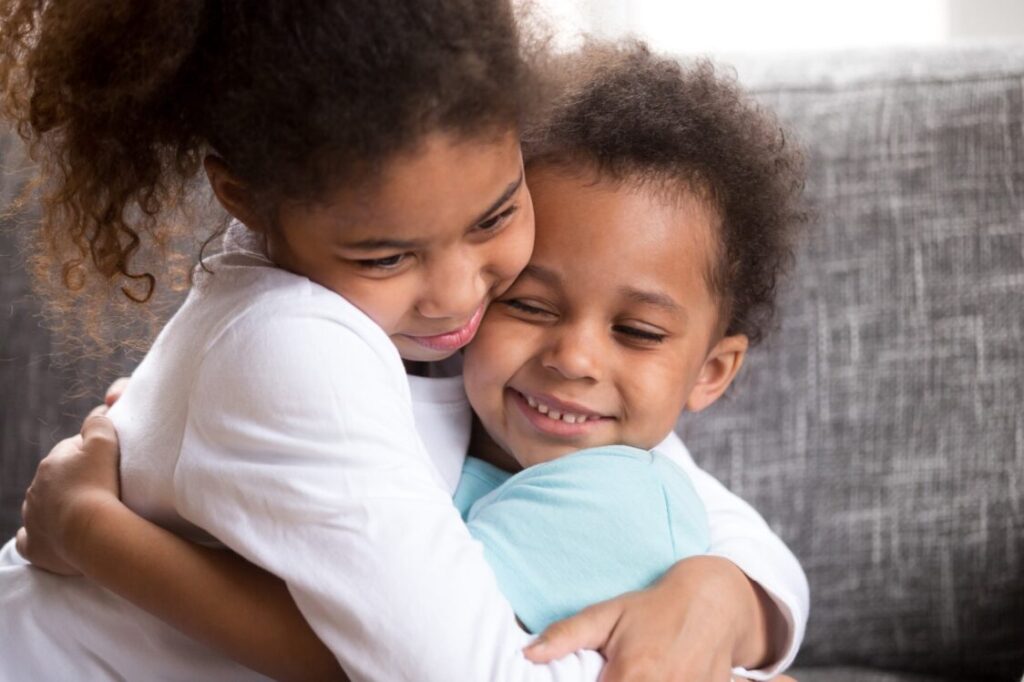An evaluation published today of a pilot event which offered a supportive environment for siblings who had been separated in the care system to reconnect, finds that parents/carers believed the event made future contact between the siblings more likely.

Developed and delivered by Coram, and funded by the Hadley Trust, the Sibling Time event was piloted in Leicestershire in early August 2023. The model aims to respond to the desire reported by children in care themselves to stay in contact with siblings and is informed by previous research* which found that good quality sibling contact is associated with positive wellbeing outcomes for children.
The pilot event was attended by ten children and 11 parents/carers, and aimed to offer a fun, supportive, therapeutic and safe environment for children who are adopted or in care to have meaningful contact with their siblings from whom they had been separated. The three-hour session was facilitated by nine professionals including staff from Coram’s Activity Days team, social workers and play specialists. The focus of the session was child-led free play with supported activities. During the session, parents and carers were offered training around various topics such as supporting sibling contact and life story work.
The evaluation of Sibling Time, carried out by Coram’s Impact and Evaluation team, featured observation of the intervention; interviews with social workers, play professionals, parents/carers and children/young people; and analysis of feedback forms.
The findings of the research indicate that Sibling Time was implemented successfully and that the service shows significant signs of promise.
Children and young people
The evaluation found that siblings who attended the event interacted enthusiastically with one another, even in the case of those with a large age disparity, including a toddler and teenager sibling group. All the children reported that they enjoyed the session. In the interviews, children expressed that they would be keen to see their siblings again in the future.
Parents and carers
Parents also found the event to be positive, with five of the six (84%) who responded to questions stating that they had an excellent experience. One parent reported: “For us it’s definitely a positive thing, and good will come of it.”
Another parent added: “When [adopted child] is older, I want to be able to say that we continued that contact with [their] birth sibling […] we’re really conscious that it’s important for [their] own identity and understanding of where [they have] come from.”
The setting was seen as particularly important. The presence of social workers on-site helped to set boundaries and reassure parents. Some parents were concerned about the potential emotional fallout but felt that the preparation and carefully curated setting mitigated this.
Parents felt the event made future sibling connections more likely and expressed a desire for more Sibling Time events to be held.
Professionals
Five of the seven (71%) professionals interviewed rated their experience of Sibling Time as excellent and all felt that children were engaged and enjoyed the time with their sibling. The professionals present had no previous experience of facilitating sibling contact but afterwards felt more confident to do so. One professional underlined the potential of Sibling Time events to act as a “starting block” for the relationships that could enable families “to feel confident to move it along to unsupervised in the community”.
Professionals also reported that the setting and activities were key to the success of the day. One professional said: ‘The venue is massively important to the feeling. If a child walks into the venue and instantly feels safe, then the sky’s the limit’. The preparation also worked well to manage potentially challenging family dynamics, with one professional noting: “Everyone turned up knowing exactly what they were there for, ready for the day, really well prepared. And that’s the adults and the children.”
The evaluation makes the following recommendations:
- Training: Provide training to staff about facilitating play to ensure that there is a common approach for all professionals at the event, as well as range of training courses tailored to parents/carers attending.
- Engagement: Seek to engage a diverse range of communities and consult all stakeholders with a view to co-producing future Sibling Time events.
- Evidence: Collect data at a local level to support its monitoring and evaluation. Conduct more large-scale evaluation to generate more detailed evidence about the benefits of the Sibling Time and the long-term outcomes.
Max Stanford, head of Impact and Evaluation at Coram, said: “Previous research has shown that contact between siblings who have been separated in the care system is associated with positive wellbeing outcomes for children, but only when it is well-managed, with parents and carers actively supporting contact and taking children’s wishes into account. Sibling Time shows signs of significant promise in helping local authorities to support meaningful contact between separated siblings, offering them the opportunity to build strong relationships and emotional connections.”
Sally Beaumont, head of Coram’s Adoption Activity Days team, said: “With the modernisation of the adoption agenda and local authorities needing support to co-ordinate family time for siblings with different care arrangements, Sibling Time offers a real solution. It was a privilege to witness brothers and sisters reconnect, sometimes after years with no contact. We need to listen to children’s wishes ensure that every child is supported to build a relationship with their siblings.”
Coram is inviting local authorities to attend a free Sibling Time information session on 19 April from 10.00 – 11.30. To find out more and to register, please contact adoption.activitydays@coram.org.uk
